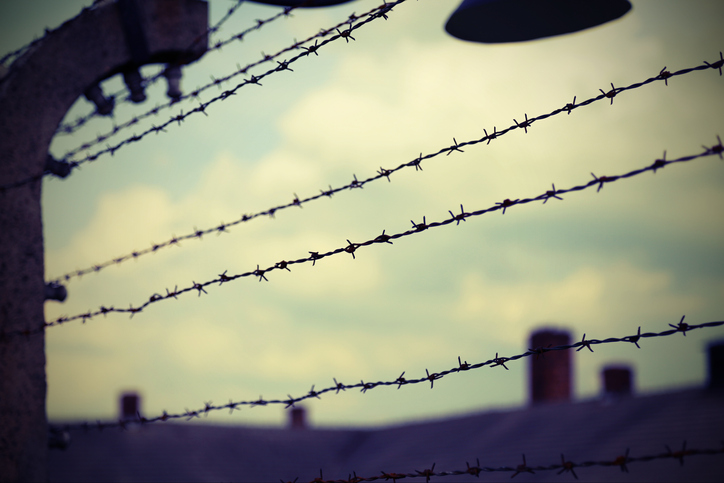On April 27, 1940, Heinrich Himmler — the head of Adolf Hitler’s bestial SS — officially opened Auschwitz, paving the way to the Final Solution.
Yet in a recent study conducted by the Conference on Jewish Material Claims Against Germany, two-thirds of American millennials have no knowledge of Auschwitz.
Moreover, anti-Semitic violence has increased at an alarming rate in the United States — from the 2018 Tree of Life synagogue massacre in Pittsburgh, Pa. to the 2019 stabbing of five Hanukkah celebrants at a rabbi’s home in Monsey, N.Y.
France, the U.K., Spain, Belgium, and the Netherlands have all experienced outbursts of Jew-hatred.
Björn Höcke, a leader of Germany’s ultra-right AfD party, scorned Berlin’s Holocaust Memorial: “Germans are the only people in the world who plant a monument of shame in the heart of the capital.”
However, Italy has a long history of Judeophilia — even in the worst of times.
During Nazi Germany’s reign of terror, many countries remained callously indifferent to the greatest crime in human history. Vichy France delivered foreign-born Jews to the Germans with gleeful alacrity. In 1942, of the 75,000 French Jews ultimately deported by the collaborationist Vichy government, 42,000 had already been expelled.
Franklin Delano Roosevelt forbade Jewish refugees on the SS St. Louis from entering the U.S. And both he and Winston Churchill refrained from bombing the death camps.
But the Italians were among the few to resist Hitler’s Final Solution.
Though Italy was an Axis power during the Second World War, its populace, military and government ministries defied their genocidal German allies to provide succor, shelter and safety to the Jews.
In fact, according to Dorothy Rabinowitz, these imperfect servants of Mussolini’s Fascist state “undertook extraordinary efforts to rescue Jews in their zones of occupation” (France, Yugoslavia and Greece).
Whereas the French prefect of the Alpes Maritmes dutifully knuckled under to the SS and placed all Jews in his sector into concentration camps, the Italian High Command — which controlled an area stretching from Toulon to the Swiss border near Geneva — adamantly refused to similarly herd the Jews.
Soldiers of the Italian Fourth Army surrounded the French police of Annecy and forcibly prevented the gendarmes from deporting Jews. Italian carabinieri guarded Jewish synagogues in Nice to ensure that the Vichy police could not enter. And Italian generals rescinded the French order to force Jews to wear the yellow star. Such a stigmatizing practice was deemed “inconsistent with the dignity of the Italian army.”
This fierce Italian resistance to the Final Solution repeated itself in Dalmatia, Croatia, and Serbia — enraging the likes of von Ribbentrop, Himmler, von Bismarck (Minister at the German Embassy in Rome) and Hitler himself. The Germans were furious that Mussolini would not directly order his generals (Ambrosio, Bastianini, Picche, and Roatta) to simply turn over the Jews.
Greek Jews in the Italian zone of occupation, which included Athens, were also shielded from Nazi barbarism. Until the armistice of September of 1943, they led normal lives. In 1941, the Athenian Jewish population increased by 5,000 when refugees fled to the Italian sector in search of safety. The Italian consuls in Salonika also intervened to rescue Jews by any means possible.
As Jonah Goldberg notes in Liberal Fascism: “Not a single Jew of any national origin under Italian control anywhere in the world was handed over to Germany until 1943, when Italy was invaded by the Nazis. Mussolini actually sent Italian troops into harm’s way to save Jewish lives.”
Despite the repugnant racial laws of 1938 and the subsequent alliance with Germany, the brusque Italian dictator, who had thwarted Hitler’s attempted anschluss of Austria in 1934, intervened to impede the extermination of the Jews.
Ultimately, however, it was the bravery and humanity of the Italian people that earned them the sobriquet “righteous Gentiles.” In The Last Man Who Knew Everything: The Life and Times of Enrico Fermi, Father of the Nuclear Age, David N. Schwartz notes that “cultural or political anti-Semitism was virtually unknown in Italy.” (Laura Capon, Fermi’s wife, was Jewish. Her husband was not.)
Elizabeth Bettina’s It Happened in Italy describes how Harry Arlin, Max Kempin and other Jewish internees were safeguarded from German eliminationism in the Ferramonti Campo di Concentramento in Calabria: “There were doctors, dentists, bakers, teachers, rabbis. They even had their own form of government.” Children were born and educated. Cantors sang. Ice cream vendors sold gelati. According to Kempin: “There were even a few weddings, at least three or four that I was aware of.”
While other nations may have vacillated in the face of evil, Italy stood implacably in defiance of the Holocaust. Hannah Arendt noted that in protecting Jews, the Italians evinced the “automatic general humanity of an old and civilized people.”
Rosario A. Iaconis is chairman of The Italic Institute of America and an adjunct professor in the Social Sciences Department at Suffolk County Community College.

































